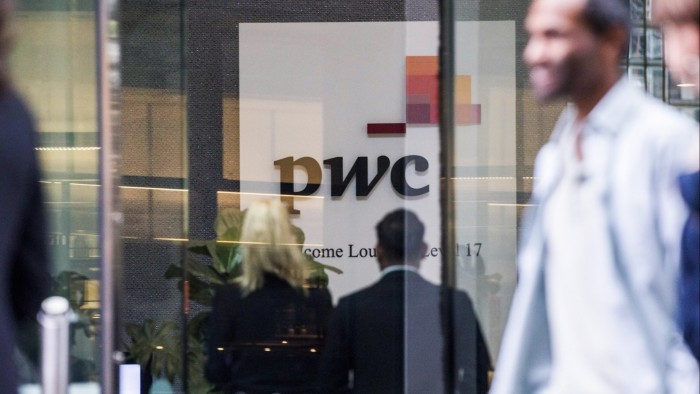Jobs outlook stirs anxiety among aspiring UK consultants

Simply sign up to the Management consulting myFT Digest -- delivered directly to your inbox.
This month, PwC said it was delaying start dates for graduate positions because there was not enough work, in the latest sign of the challenges being faced by the Big Four consultancies in 2024.
The firm told nearly 100 junior consultants in the UK that they would be spending an extra six months on its graduate scheme, citing a reduction in business demand, challenging market conditions and headcount pressures.
After a rapid expansion of consulting work in the pandemic, the sector has seen a fall in demand amid a deteriorating economy and cost-cutting, with large consulting firms announcing cuts and pushing back the timings on graduate jobs.
Last year, Deloitte said it was making 150 junior consultancy roles redundant in the UK. In the US, meanwhile, EY deferred starting dates by a year for new graduates “based on emerging business conditions”. Starting salaries at some of the biggest firms, McKinsey and Bain, have been frozen.
This has fostered anxiety among applicants, says Dabin Choi, a second year undergraduate studying business management at the London School of Economics and head of marketing at the university’s consultancy society. She aspires to work as a consultant.
“Students in my year have been stressed about getting a role,” says Choi. “Some of my friends are looking elsewhere . . . applying for roles that might not suit [their] interests.” She is also looking into postgraduate study, in case she needs to defer her consulting plans.
“It has been a period of worry for some young consultants,” agrees Tamzen Isacsson, chief executive of the Management Consultancies Association (MCA). “Many of them haven’t seen the sector making redundancies before.”
She says there are reasons to be optimistic, however: “We had 20 per cent growth for two years and demand for talent, and the market has stabilised to a normal level of about 8 to 9 per cent growth.”
PwC and BCG are among the firms saying that graduate recruitment is steady, though they are targeting candidates beyond the top universities. Isaacson says: “More firms are trying to recruit from more diverse talent pools — from schools and colleges, trying to train future consultants.”
In response, candidates have been open to considering smaller or mid-level consultancies, says Sarah Juillet, director of postgraduate careers and professional development at Bayes Business School in London.
“There’s a diversification of the types of consulting they are interested in that historically they might not have [been].”
This is also due to shifting priorities. A decade ago, the priority for applicants was salary, says Juillet. Now they want to know about “work-life balance and development”. Dabin says this might also be because consulting pay “is above average, which is why people have the luxury of seeking secondary benefits”.
More stories from this report
UK’s Leading Management Consultants 2024: the ratings
UK consultants adjust to continued market slowdown
‘We’re all busy again’, say UK restructuring experts
Consultants navigate regulatory sensitivities in the AI era
Backlash and cuts prompt diversity strategy refresh
UK companies cut spend on sustainability advice as demand shifts
This is backed by the MCA, which found the greatest job satisfaction among new consultants was flexible working (39 per cent), higher than remuneration (36 per cent).
Nonetheless, Anne Clinton, interim director of the careers service at the London School of Economics, says there are still substantial numbers of graduates who expect a long hours culture: “It’s about [entering] a high-status profession.”
Dabin says she is going into the profession with her eyes wide open, keen to gain experience from a prestigious employer.
Hybrid work patterns have helped those young consultants who desire flexibility but employers are also keen to maintain an in-person apprenticeship model.
Ian Elliott, PwC’s UK chief people officer, says: “We’re big fans of the office, but we know hybrid works very well. People will develop more quickly and learn how to network if they spend more time in the office.”
Graduates who spent part of their time at university studying virtually, he says, have taken longer to speak up in meetings and network. PwC now pairs new joiners with senior associates for the first three to six months and provides coaching. As AI replaces some entry-level tasks, it is important to “think differently about the skills our graduates need”, Elliott adds.
Clinton hears from employers that this generation of students’ “transition to employment is harder”. Firms are trying to educate partners on how to interact with them, while also trying to educate the new hires.
Isacsson says that, when market conditions declined post-pandemic, “there were more young consultants on the bench [between clients]”. Many employers have “worked hard to put them on client projects, even though conditions have been tighter. It is recognised that you need to get them out”, she adds.
Jessica Frame, managing partner of BCG’s London office, says: “When I started out, I just wanted to be told ‘well done’. Now, young people want to be more engaged in projects and ownership of the firm. The more junior cohorts are more passionate. They want to make a difference.”
Isacsson says young consultants tell her they want to drive change in the public sector, [and] to work in sustainability for firms: “We have a young generation that has a voice and is motivated.”
As a result, recruiters are reframing their pitches to graduates, notes Juillet.
“Consultancies are coming in and talking about their sustainability [commitments]. They used to say they were the best company; now they say ‘this is what it’s like working for us and these are our values’.”

Comments